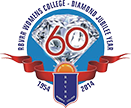Outcomes:
Course Title : MECHANICS
- Relative motion, inertial and non inertial frames of references.
- Study of interaction of force between solids in mechanical systems.
- Centre of mass and inertial tensor of mechanical systems
Course Title : (waves and oscillations)
- Distinguish between oscillators and normal models in a coupled oscillator system.
- Application of Fourier transforms to a range of physical situations.
- Description of longitudinal wave in solids.
Course Title : optics
- The students should demonstrate fundamental knowledge and insight into physical optics and geometrical optics in order for student to be able to understand and solve problems related to the eye and optical instruments/lenses, their function and correction.
- Students are expected to understand ray-based optical system analysis and design, and operation of simple optical instruments.
- Knowledge and understanding should be demonstrated in the areas of: (1) refraction at single spherical or plane surfaces, (2) thin lenses, (3) thick lenses, (4) aberrations.
- Understand that light is an electromagnetic wave and understand properties of light caused by the wave nature such as polarization, interference and diffraction, lasers and their applications.
- To learn the basic elements of optical fiber transmission link, fiber modes configurations and holograms.
Course Title : thermodynamics
- Ability to understand the basic concepts of thermodynamic such as temperature, pressure, system, properties, process, state, cycles and equilibrium.
- Understand laws of thermodynamics and its applications.
- Use the first law of thermodynamics to calculate the work, power output/input, heat transfer, or heat transfer rates for thermodynamic processes or cycles containing solids, liquids, vapors, and/or ideal gases.
- State the second law of thermodynamics in various ways.
- They are able to understand how to produce low temperature using different expansions.
- Apply statistical mechanics to solve for real systems (a system for many particles).
- Students can understand properties and laws of thermal radiations and how the energy distribution in thermal spectrum.
Course Title : ELECTRICITY AND MAGNETISM
- Developing systematic reasoning.
- Conceptual differentiations
- Establishing phenomenological relations
Course Title : Electronic Principles and applications
- Success in analyzing electronic circuits and their network skills.
- Ability to study and analyse the basic components electronics.
- Ability to acquire new knowledge to use electronics equipments in day to day life.
- Students will be able to design and conduct experiments, analyze and interpret data in the field of electronics.
Course Title : ELECTRO MAGNETIC THEORY
- Ability to understand and apply basic science, circuit theory, Electro-magnetic field theory, control theory and apply them to electrical engineering problems.
Course Title: MODERN PHYSICS
- Demonstrated ability to solve relativistic mass, energy and momentum problems.
- Demonstrated ability to apply wave – particle duality and uncertainity principle, quantum mechanical Eigen value equation etc. to solve physics problems.
- Understand and explain the differences between classical and quantum mechanics.
- Understand the fundamental principles of nano technology and their application in various fields of science and technology.
Course Title : SOLID STATE PHYSICS
- Elastic properties of solids and lattice vibrations.
- Properties of metals on the basis of the free and nearly-free electron gas models.
- Essence of density functional theory and its underlying building blocks.
- Magnetic properties of condensed matter.
- Optical properties of solids and the relation to their electronic properties.
Course Title : SPETROSCOPY
- how light interacts with matter and how it can be used to quantitatively understand chemical samples
- spectroscopy the way other common tools of measurement like the watch or the ruler are understood
- basic concepts of instrumentation, data acquisition and data processing.
- seeing that spectroscopy is a set of tools that can put be together in different ways to understand systems and solve chemical problems.





